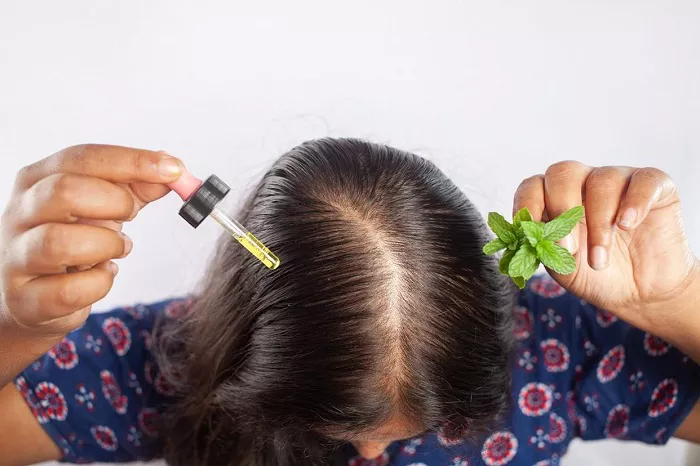As hair loss continues to be a widespread concern for both men and women, many people turn to natural remedies in search of solutions. Among the popular options circulating online is peppermint oil—a staple in everything from chewing gum to cosmetic products—now gaining attention as a potential treatment for thinning hair.
But does the science support the claim that peppermint oil can stimulate hair growth? Here’s what we know so far.
What Is Peppermint Oil?
Peppermint oil is a concentrated essential oil derived from the Mentha piperita plant, a hybrid of watermint and spearmint. Known for its distinctive aroma and cooling sensation, the oil contains menthol, an organic compound responsible for its anesthetic and invigorating effects on the skin.
Commonly used for digestive issues, muscle aches, and headaches, peppermint oil is also frequently included in shampoos and conditioners for its fresh scent. However, claims about its ability to promote hair growth remain largely unverified by human trials.
What the Research Shows
To date, scientific research examining peppermint oil’s effectiveness in promoting hair growth is limited. One notable study, published in 2014, observed the impact of peppermint essential oil on hair growth in mice.
Researchers divided the mice into four groups, each receiving a different treatment: saline, jojoba oil, a 3% peppermint oil solution in jojoba, and a 3% minoxidil solution. After four weeks, the group treated with peppermint oil demonstrated the most significant hair growth—outperforming even the minoxidil group.
Scientists attributed this to enhanced blood circulation in the scalp and stimulation of the hair follicles into the anagen (growth) phase.
While promising, the study has several caveats:
It was conducted on animals, not humans.
The sample size was small (around 20 mice).
The study has not been replicated in large-scale human trials.
Another 2016 study found that menthol, a key component of peppermint oil, may increase blood flow when applied topically, suggesting a possible mechanism for encouraging hair growth. Still, more research is needed to confirm these effects in humans.
Potential Hair Benefits Beyond Growth
Though not conclusively proven to regrow hair, peppermint oil may still offer some benefits for scalp health. Its antimicrobial and anti-inflammatory properties may help with common scalp conditions such as dandruff and irritation. Cultures throughout history—including the Greeks, Romans, and Egyptians—have used peppermint for various ailments, though modern science has yet to substantiate many of those traditional uses.
How to Use Peppermint Oil for Hair
If you’re interested in trying peppermint oil for your hair, here are a few safe ways to incorporate it into your routine:
Use products that contain peppermint oil: Many commercial shampoos and conditioners list it as an ingredient.
Add it to your existing products: Add one or two drops of peppermint essential oil to the shampoo or conditioner in your palm before applying.
Apply as a scalp treatment: Mix one to two drops of peppermint oil with a tablespoon of a carrier oil like jojoba, coconut, or shea butter oil. Massage into the scalp before rinsing.
Possible Side Effects
Peppermint oil is generally considered safe when used properly, but it can cause side effects, particularly when used in concentrated forms:
Topical risks: Skin irritation, itching, and rashes may occur, especially in people with sensitive skin.
Inhalation risk: Peppermint oil should not be applied to the faces of infants or young children, as menthol can be harmful if inhaled.
Oral side effects: Ingesting peppermint oil may lead to heartburn, nausea, or allergic reactions in some individuals.
As with any new product, start with a small amount to assess tolerance and avoid overuse.
Alternatives to Peppermint Oil for Hair Loss
If you’re experiencing hair thinning or loss, several treatments with stronger clinical backing are available:
Minoxidil: An FDA-approved topical and oral medication that promotes blood flow to hair follicles and supports growth.
Finasteride: An oral drug that reduces levels of DHT, a hormone linked to male pattern baldness.
Saw Palmetto: A natural supplement believed to block DHT and support hair health.
Biotin: A B-vitamin commonly found in supplements that supports healthy hair, skin, and nails.
The Bottom Line
Peppermint oil is an appealing natural remedy, and early research suggests it could help stimulate hair growth by increasing blood flow to the scalp. However, the evidence is far from conclusive, especially in humans.
If you’re curious about peppermint oil, it may be a useful addition to your hair care routine—particularly for scalp health—but it shouldn’t replace clinically proven treatments if you’re dealing with significant hair loss.
In the world of natural remedies, peppermint oil may help you feel refreshed, but don’t expect a miracle cure—at least not yet.
Related Topics:
- 10 Common Hair Washing Mistakes, According to Professional Stylists
- Customized Hair Care Market to Hit $10.4B by 2034
- How to Recreate Daisy Edgar-Jones’s Romantic Side Fringe


